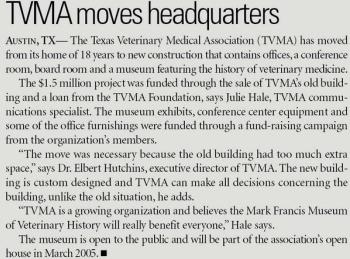
What puzzled me, though, was how I got in the crosshairs of the government when I had tried to carefully comply with all the tax rules. Simply, how could this happen to such a law-abiding citizen?
Christopher J. Allen, DVM, JD is president of the Associates in Veterinary Law P.C., which provides legal and consulting services exclusively to veterinarians. He can be reached via e-mail at info@veterinarylaw.com. Dr. Allen serves on dvm360 magazine's Editorial Advisory Board.

What puzzled me, though, was how I got in the crosshairs of the government when I had tried to carefully comply with all the tax rules. Simply, how could this happen to such a law-abiding citizen?

What puzzled me, though, was how I got in the crosshairs of the government when I had tried to carefully comply with all the tax rules. Simply, how could this happen to such a law-abiding citizen?

All partnerships should have the legal equivalent of a prenuptial agreement.

It is a veterinarian's legal and moral responsibility to let owners know when their dog has had a dangerously aggressive attitude.

Disappointed clients rarely sue veterinarians. Neither do sad clients. Clients who sue are shocked clients ...

It is always interesting to me how much health professionals complain about the intervention of the Occupational Safety and Health Administration (OSHA)into their practices and the costs and inconveniences of compliance.

The examination room can be a horridly stressful place. The stomach butterflies often begin before the veterinarian even walks in the door.

Sometimes it seems as though the clinical practice of veterinary medicine is a perpetual manifestation of the timeworn expression "no good deed goes unpunished."

The world only seems to get more and more complex, and the more we "grab life by the horns," the more complicated entanglements we face.

You'll never witness any shortage of complaints and dismay associated with being the spouse or significant other of a practicing veterinarian. There are the long hours and late nights. There are lots of parties you show up at late. Then, there are those movies and theatrical performances you only see part of; whether you miss the first third or the last third depends on when the emergency call comes.

Ever hear that expression, "I wouldn't do that for love or money?" I suppose that what the expression really means is that "I wouldn't do that for anything." The logical inference is that if there is no emotional or economic motivation, there isn't any motivation at all. In the law, and in the veterinary workplace, the truth of this inference plays out each and every day.

This month, we begin a series covering a particularly relevant topic in veterinary law, yet one that is widely overlooked both by lawyers when they are counseling veterinarians and veterinarians as they seek out legal advice.

Last month we discussed the pressure tactics parents, uncles, aunts and friends of young people can use on us as veterinary practitioners to arrange for their favorite youngster to come into our clinics and "observe."

You don't have to be a veterinarian for very long before it happens to you.

In the first part of this series, we identified a number of problem areas that surround the employment relationship when a practice hires (perhaps a better word would be "enlists") a part-time or relief veterinarian.

Don't overlook disability and pension benefits; make sure you understand documents; legalese can short-circuit best intentions

The initial two articles in this series on associate employment contracts dealt primarily with legal details of the contract; contract periods, renewal provisions and other esoteric elements that are commonly ignored when a new associate is considering a job offer.

Pay close attention to deadlines, dates and expirations

There are a host of decisions and options facing newly graduating veterinary students as they work through their final year.

Veterinarians who are preparing to enter into partnerships are usually thinking one main thought, "We are going to make such great money and I can't wait to be able to share the workload."

Second in a three-part series

DVM Newsmagazine readers who have seen my articles in the past know that as an attorney and business counselor, I am very conservative in recommending veterinary partnerships.

As we mentioned last month, the best way to protect assets that have accumulated over a lifetime has a great deal to do with the perceived threats.

As seasoned veterinary practitioners, we pretty much come to expect the unexpected.

Last time we reviewed a number of issues concerning situations where veterinarians and their local or state governments come into conflict.

Knowing how to 'work' muni government reaps rewards

Workers' compensation is not a particularly riveting topic. Financially, however, it is very significant to every veterinary practice, its staff members and, ultimately, to clients.

Last week I received a phone call from a veterinarian who had purchased a puppy and had a problem.

In the first two articles in this series on non-competition contracts, we saw the extent to which failing to be specific or failing to be cautious can work to the disadvantage of both parties to such an agreement.

In last month's article, we looked at various ways to free-up more of the veterinary clinic budget by saving on discretionary legal and accounting fees.